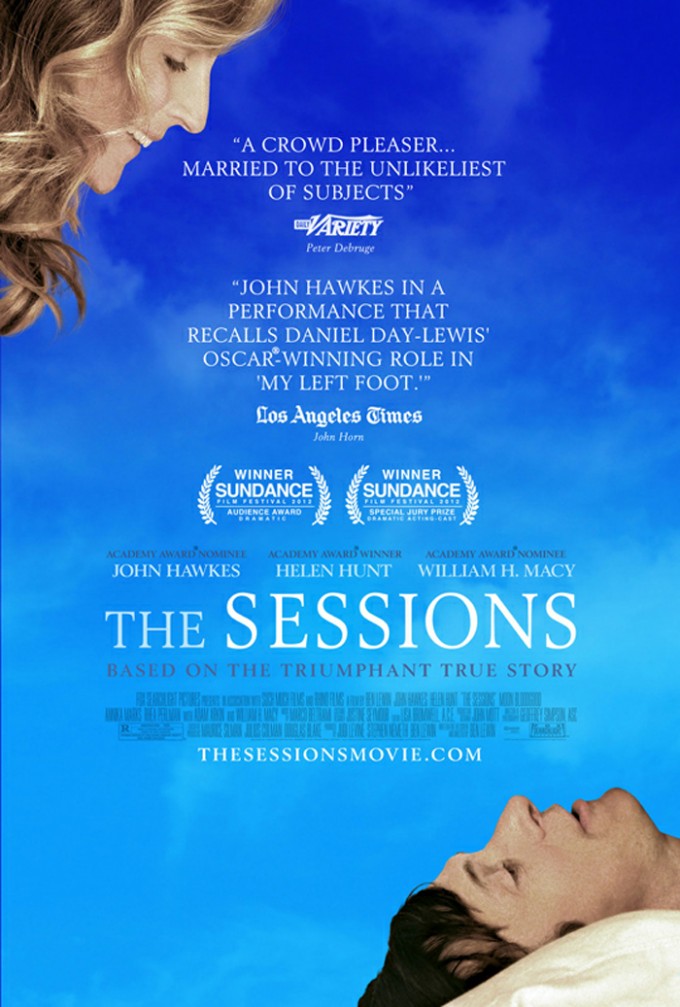The Sessions
 The Sessions
The Sessions
Directed by: Ben Lewin Cast: John Hawkes, Helen Hunt, William H. Macy, Moon Bloodgood Running Time: 1 hr 35 mins Rating: R Release Date: October 26, 2012 (Chicago)
PLOT: In hopes of feeling something remarkable, a man with polio constricted to his iron lung (Hawkes) hires a sex surrogate (Hunt) to help him lose his virginity; he seeks spiritual consulting from his priest (Macy).
WHO'S IT FOR? Anyone who can appreciate a good performance by John Hawkes will enjoy watch him surprise with his performance in The Sessions. In that sense, The Sessions is looking to be this year's My Week with Marilyn.
OVERALL
The centerpiece of The Sessions is obviously the work of Hawkes, ever the physical chameleon who can transition from creepy villain to unimposing average man. As O'Brien, who was stricken with polio at the age of six, Hawkes has a raspy voice and a specific body configuration, and is pushed around by various other actors. This is a performance that is most impressive for its physical feat, the naturalness that Hawkes has in his appearance with such a condition from the very beginning of the film.
Unfortunately, Hawkes is working against dialogue that seems to abuse the wit potential of his character, forcing Mark's humor to a point of unnaturalness that screenwriters often can't tell they have reached. Though his statements are at times interesting (such as the clever "I believe in a God with a sense of humor,") the crowd pleasing potential of Mark seems to be overdone by a script that always gives him the right line, at the right time.
The Sessions too often rubs its viewer the wrong way with its blatantly placed devices that only achieve flat humor, in moments that expose this script for the simplicity in its supporting characters and their arcs. An elementary interaction between Mark's assistant (Bloodgood) and a nosy motel employee is used for a cheap one-note laugh, and is referred back to provide more comic relief on top of all business relating to the film's title events. Worse than this is the entire concept of having O'Brien recollect his events to his priest, in the setting of a church, which always makes for a forced joke on the audience about how absolutely zany such a set up is. Unfortunately, this is a storytelling device that The Sessions mirthfully continually returns to, with satisfaction in making the same joke that felt forced in its inception.
When not relying on the undeniable charm of Mark, or putting viewers through flat comedic interactions, The Sessions has hit-and-miss aesthetic work as well. The flatness of the comedy in the church isn't assisted by the bland camerawork, which is preceded by obvious corny cuts to shock on Macy's face. In some strides, the score of the film, gentle with strings and piano, does delicately service the emotions of the story as well.
But when it comes to tact, whether one is in the bedroom, or writing a script, perhaps John Cleese opined best about it in his introductory intercourse instructional scene in The Meaning of Life: "What's wrong with a kiss? You don't have to go leaping straight for the clitoris like a bull at a gate. Give her a kiss, boy!"
A unique recollection of a universal experience in sexual discovery, O'Brien's story has components that can tune into an audience's nerves, especially with a strong actor such as Hawkes portraying the film's wise-cracking, caustically optimistic, adversity-defying underdog. It's a story that could be liked from the plot synopsis alone (unless you'd prefer to think sex doesn't exist). But The Sessions lacks such subtlety when trying to connect with its audience, a deception to the story's naturally charming elements. Bungling its desire to be an emotional stud, The Sessions is far too eager to hang onto its ego as crowd pleaser.
FINAL SCORE: 5/10